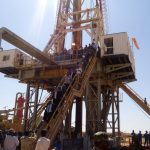Araweelo News Network

FILE – Engineers and visitors explore an exploratory well near Dharoor town, from the port of Bosasso on the Gulf of Aden in Puntland, Somalia.
The waters off Somalia, best known for years of piracy, may harbor hydrocarbons at a depth where crude is usually found, seismic services company Spectrum said last week its research showed. This is unlike the seas further south along the African coastline where gas is abundant.
That would be good news for Somalia, which would likely find pumping out oil onto tankers easier than securing the multi-billion dollar investment needed to liquefy gas for export.
Oil revenues could transform Somalia’s economy, where many people rely on subsistence livestock farming. However, it could prove a challenge for a government trying to rebuild a nation battered by clan rivalries and Islamist insurgents after it descended into war in 1991.
“Disagreements between the member states and the federal government could fuel violence and corruption in a country that is still very much trying to build and extend governance,” said Ahmed Soliman, an expert at British think-tank Chatham House.
Some fear oil rigs could also become a new target for pirates, who were the scourge of commercial shipping on nearby trade routes until naval protection and costly security on ships drove them away. The last major hijacking was reported in 2012.
“Somalia is still extremely fragile and hence the risk of the piracy resurfacing is a concern,” said Cyrus Mody, assistant director in the ICC International Maritime Bureau.
Seas of black gold
Onshore exploration in Somalia took place in the 1950s but the collapse of the government and ensuing conflict 25 years ago kept oil firms away. Much of the geophysical data that had been gathered by the state was lost or destroyed.
But explorers have been spurred on by finds of offshore gas in Tanzania and Mozambique and onshore oil in Kenya and Uganda, although exploiting those reserves has been hamstrung by the slide in oil prices and retrenchment by oil firms.
“It is very prospective,” Neil Hodgson, vice president for geoscience at Spectrum, told Reuters, adding that Somalia’s source rock was similar to that found in Mozambique and Tanzania but the deposits were not as deep, suggesting oil over gas.
Spectrum has acquired 20,000 km of 2D data from the government and shot 20,000 km itself as part of its research.
The so-called “gas window” for gas reserves occurs at depths of three to six kms and extremely high temperatures. Oil is usually found at lower temperatures, between two and four kms.
Round one begins
Somalia is pressing on with its exploration plans. Last week, officials announced its first offshore hydrocarbon licensing round at a conference in Cape Town.
The initial round will cover areas off central and southern Somalia and will exclude shallow water block concessions signed in 1988 with Shell and Exxon Mobil.
Abdulkadir Hussein, technical director-general in Somalia’s Petroleum Ministry, said a new majority-state owned national oil company and regulatory body should be operational next year.
Initially, the state oil firm would get a free 10 percent stake in all hydrocarbon ventures.
“Later, when the company becomes established it will participate with its own money, up to a limit of 30 percent,” he told Reuters.
Jamal Mursal, the Somali Oil Ministry’s permanent secretary, said Somalia was working to build capacity to handle the new industry. “We have more to do but are getting there,” he said.
But investors will also need more reassurance about doing business with a government that has had to fend off past criticism from donors about corruption and poor management. The country also needs to put in place legislation.
“There’s still uncertainty about the exact implementation of the petroleum law at all levels of government,” said Ed Hobey, an analyst with Africa Risk Consulting.
source: http://www.voanews.com/




